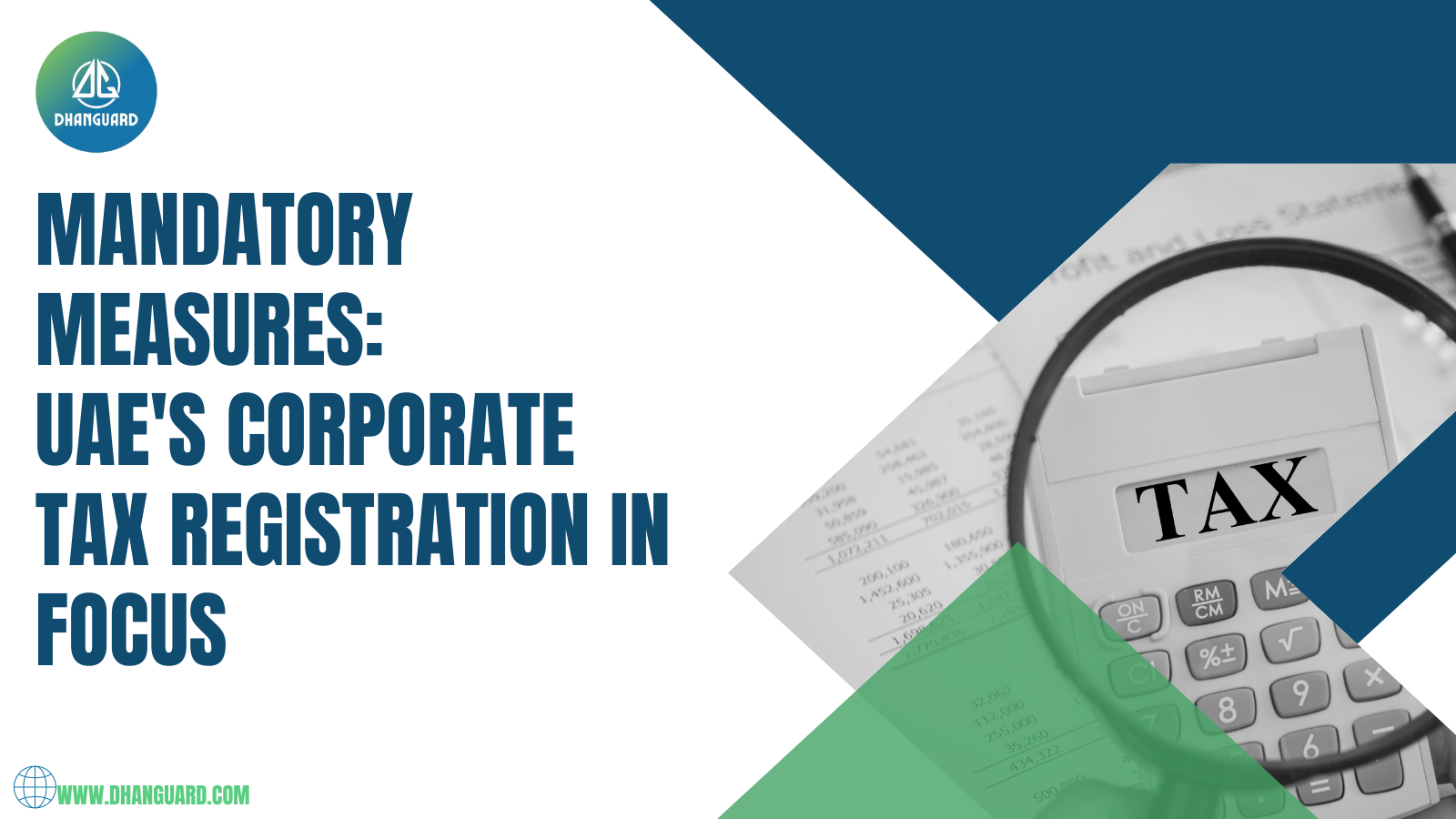In the fast-paced and rapidly evolving economy of the UAE, the regulatory bodies of the UAE have recently introduced the guidelines for corporate tax on June 1, 2023. In order to become familiar with these new guidelines, businesses need to comprehend the organizational requirements such as tax enrollment, deregistration, filing of corporate tax returns, and payment. In this blog, we will cover all the key pointers related to the evolution of corporate taxation, deadline for corporate tax registration, steps to register and impact of corporate tax registration in UAE.
The UAE's Corporate Taxation Evolution
UAE, earlier known for its tax-friendly environment and absence of corporate and income taxes has attracted businesses worldwide. The rapidly evolving economy of UAE has motivated the government of UAE to diversify its sources of revenue. Thus, the government of UAE enforced the corporate tax in June, 2023. As businesses navigate this evolving fiscal landscape, adaptability and strategic planning become paramount. The UAE's commitment to maintaining its status as a global business hub remains unwavering, and the evolution of corporate taxation is a crucial component of this journey towards a more diversified and resilient economic future. This change in UAE’s tax policies was marked as a revolutionary change and was considered as one of the best decisions of the government of UAE.
Deadline for Corporate Tax Registration
With the implementation of the new corporate tax regime in the United Arab Emirates, taxpayers have up to 21 months from the beginning of their fiscal year to prepare to file and pay their taxes. If the financial year starts from June 1, 2023 and ends on May 31, 2024, then the taxpayers can file their corporate tax return till February 28, 2025.
Corporate Tax Rates in UAE
Following are the Corporate Tax Rates in UAE for businesses:
-
Taxable income up to AED 375,000: 0% corporate tax rate
-
Taxable income over AED 375,000: 9% corporate tax rate
-
Multinational corporations subject to OECD Base Erosion: 15% corporate tax
Corporate Tax on Free Zones in UAE
Special advantages are provided to businesses operating in UAE’s free zone. A special corporate tax rate of 0% on their "Qualifying Income in UAE" is only available to Free Zone companies and qualifying Free Zone individuals. The transactions carried out by the entities determine the qualifying income.
Why Early Registration of Corporate Taxes Matters
The following are the reasons for early registration of corporate taxes:
Avoiding Penalties
Late registration of corporate taxes can lead to the imposition of heavy penalties. The tax authorities of UAE closely monitors businesses and imposes strict penalties on businesses failing to meet the registration last date. By registering early for corporate taxes, companies can minimize the risk of penalties charged.
Operational Preparedness
Corporate tax registration is a complex process, thus, it requires a comprehensive understanding of a company’s financial structure. Early registration allows the businesses to collect all the relevant financial data timely which further facilitates a smooth registration process.
Strategic Planning
Corporate taxation is a strategic decision in addition to a financial one. Businesses can evaluate how corporate tax will affect their overall financial strategy by registering early. This includes evaluating potential tax liabilities, identifying opportunities for tax optimization, and adjusting business plans accordingly.
Registering for Corporate Tax: A Step Towards Compliance and Growth
Businesses operating in UAE should follow the given steps for corporate tax registration online to ensure a seamless registration process:
Getting a TRN (tax registration number)
Getting a tax registration number (TRN) is the first step in registering for corporation tax in the United Arab Emirates. This number is specific to your company and is needed for all national tax-related transactions. You must go to the Federal Tax Authority (FTA) website and complete the online corporate tax registration form to receive a TRN. You must complete the form with details about your company, including its legal name, trade license number, and contact information. After you submit the form, the FTA will check it and, if everything is in order, will issue a TRN.
Arranging the paperwork needed for registration
Getting the required paperwork for registration is the next step after obtaining a TRN. Depending on the kind of business you run, these documents may differ, however often speaking they consist of:
-
Trade license: A copy of your current license provided by the UAE's appropriate authorities.
-
Association Memorandum (MOA): A copy of the MOA is usually necessary for businesses. The company's operations, shareholders, and share capital are described in this paper.
-
Copies of passports: copies of each authorized signatory's passport and that of the directors and shareholders.
-
ID of the Owner's Company: Copies of each authorized signatory's ID and
-
Before starting the registration procedure, ensure all necessary paperwork is in order and current.
Applying for tax registration
Now that you have your TRN and the necessary paperwork, you may submit your application for tax registration. The FTA site can be used to complete this online. You must complete the application with information about your company, including its operations, revenue, and any applicable exemptions or special considerations. Double-check all the information before submitting the application to prevent any delays or issues.
Examined and authorized by the FTA
The FTA will review your application after it has been submitted. It's vital to have patience, as this can take some time. The FTA will check the information submitted during the review process and may ask for more documentation or explanation if necessary. For the approval process to go well, you must reply to any requests from the FTA as soon as possible.
Submit a Corporate Tax Application (During your Tax Period)
You will get a tax registration certificate if your application is accepted. This document attests that your company is now officially registered in the UAE for corporate tax. Once you get the certificate, you can pay your company taxes. The tax amount will vary based on several variables, including your company's turnover and activities. You must connect with Dhanguard to precisely determine and pay your company tax obligations.
Is Corporate Tax Registration in UAE a Mandatory Obligation?
The government of UAE mandates it for the businesses to register themselves for corporate tax. In order to determine tax liabilities, the process requires the submission of accurate financial information. The aim of the government is to foster an environment in which businesses are transparent, accountable, and fairly contribute to the socio-economic development of the country. Companies need to collect their financial records carefully, making sure the data is accurate and comprehensive. This process is facilitated by the Federal Tax Authority (FTA), which provides an easy-to-use online portal for corporate tax to assist businesses in navigating the registration network. It is essential to submit accurately and on time in order to prevent penalties and maintain good relations with tax authorities.
Impact of Implementing Corporate Tax in the UAE
The implication of corporate tax in the UAE has made a significant impact on the following:
-
Businesses operating under commercial license in the UAE.
-
Operations concerning the Banking sector
-
Foreign companies and investors
-
Taxable persons as per the guidelines of the government
Exempt from UAE Corporate Tax
The following entities are exempted from corporate taxes in UAE:
-
Businesses dealing in extraction of natural resources
-
Capital gains and dividends received from businesses operating in UAE
-
Salary derived from private or public sector
-
Income earned by foreigners from investments
Conclusion
The implementation of corporate tax has made a significant change in UAE’s revenue model. As businesses operating in UAE have molded themselves accordingly due to the evolving dynamics of the country, it is necessary to understand the legalities like deadline, registration process and impact of corporate taxes in UAE. In the pursuit of economic diversification, the UAE is laying the foundation for a more sustainable and resilient future. Companies that embrace these changes with agility and foresight are likely to thrive in this new era of taxation. The deadline for corporate tax registration is not just a legal requirement; it is an opportunity for businesses to demonstrate their commitment to compliance, strategic planning, and long-term success in the UAE's evolving business landscape. Our expert team will assist you to learn the importance of corporate taxes and the intricacies involved in it. Dhanguard ensures seamless corporate tax compliance in Dubai, alleviating your burdens. Trust us to navigate the complexities and keep your business tax-ready.
DhanGuard: All-in-One Solution for Business Setup in Dubai, UAE
DhanGuard is your ultimate one-stop solution for all your business needs. Whether you’re planning to set up a new company or expand your existing business in the UAE, we’ve got you covered with our comprehensive range of services. From Company Formation in UAE and Business Bank Account in UAE services to managing your financial and legal compliance, we provide everything you need under one roof.
Our services include:
- Company Formation in UAE and Dubai
- Opening a Business Bank Account in UAE and Dubai with a 99% success rate
- VAT & Corporate Tax Compliance
- Accounting, Bookkeeping, and Auditing Services
- Trade License Renewal
- Golden Visa Assistance
Let DhanGuard make your journey of Business Setup in Dubai seamless and hassle-free!







